Not many kitchen-cupboard essentials can lay claim to being as good on laundry as they are on chips or in a salad dressing. Such is the reputation of vinegar. According to an extraordinary book, Vinegar: 1001 Practical Uses, by Margaret Briggs, it acts as a stain remover and fabric softener, as well as an odour eater. And that’s just the start of it.
The book reveals that this humbly named, pungent liquid (from the French vin aigre, meaning ‘sour wine’) is considered a cure-all, clean-all panacea that can simultaneously be used as a digestive aid, hair rinse, weedkiller and drain unblocker to name but a few.
There are countless other websites and books, such as Vinegar & Oil by Bridget Jones, that also recommend uses for vinegar as a cheap chemical-free cleaning product or a healing elixir.
Win one of three copies of Vinegar and Oil by Bridget Jones
This is nothing new: with its 10,000-year history, vinegar has been around as long as booze – in fact it’s a natural byproduct of alcohol production (when airborne bacteria seep into the cask or bottle they chemically change the liquid into acetic acid). Many civilisations have valued vinegar as a preservative, flavouring and medicine. Circa 500BC, Hippocrates, considered the father of western medicine, prescribed it medicinally for cleaning wounds and treating sores and coughs.
Few of the claims made for vinegar are backed up by science. Some uses have gained scientific credibility, such as its antimicrobial properties in the context of food preparation. A 2006 review of existing studies points to the medical uses of vinegar that do have promise, including treating diabetes (vinegar helps control blood glucose and insulin levels) and weight loss (vinegar may help people feel more full). In other cases, such as wound care, the report states that experts caution against using vinegar preparations.
Through trial and error I discovered some uses work really well – as a kettle descaler it’s fantastic – whereas for others the results are disappointing. I tried it as a laundry fabric softener and didn’t notice any difference. One thing’s for sure, this inexpensive ‘sour wine’ deserves some respect for its importance in pickles, chutneys, sauces, marinades and dressings, as well as for its versatility around the house. A couple of varieties on your kitchen shelf are essential.
MALT
Vinegar is a good all-round cleaning and sanitising agent. The acidity kills a broad range of bacteria and mould, helps cut through grease and removes mineral buildup such as hard water spots. For cleaning purposes, white distilled vinegar is best. Use two parts water to one part vinegar for general cleaning.
 Sarson’s Distilled Malt Vinegar (99p, 568ml) is cheap and widely available. This clear white vinegar is made by distilling ordinary malt vinegar to produce a strong liquid, high in acetic acid. There are so many things you can do with this vinegar. Here are just three:
Sarson’s Distilled Malt Vinegar (99p, 568ml) is cheap and widely available. This clear white vinegar is made by distilling ordinary malt vinegar to produce a strong liquid, high in acetic acid. There are so many things you can do with this vinegar. Here are just three:
• Tackle dirt-smeared windows by mixing equal amounts of water and distilled vinegar in a spray bottle. Then simply spray on and wipe clean.
• Get rid of unwanted crunchy limescale bits in your cups of tea by half-filling the kettle with a mixture of water and vinegar (half and half). Boil and rinse well.
• To remove lingering cooking odours boil a teaspoon of white vinegar mixed in half a pint of water. Note that vinegar is an acid so if you’re going to be handling it for more than a few minutes remember to wear gloves. Distilled malt vinegar can also be used for pickling fruit and vegetables.
 Sarson’s Malt Vinegar (89p, 400ml), made from malted barley, is good for pickling too, as well as being the default vinegar for chips. For pickling ease you can also buy it ready spiced: Sarson’s Malt Vinegar for Pickling (£1.48, 1.14 litres). It’s virtually impossible to buy organic malt vinegar so Sarson’s is your best bet.
Sarson’s Malt Vinegar (89p, 400ml), made from malted barley, is good for pickling too, as well as being the default vinegar for chips. For pickling ease you can also buy it ready spiced: Sarson’s Malt Vinegar for Pickling (£1.48, 1.14 litres). It’s virtually impossible to buy organic malt vinegar so Sarson’s is your best bet.
APPLE CIDER VINEGAR
Pale gold in colour, this vinegar is made from matured apple juice, cider or apple pulp. Those who use it as a health tonic claim the best type is made from freshly crushed apples and is unpasteurised and unfiltered. The resulting cloudy-loooking liquid contains a web-like like substance known as the ‘mother’ (said to be the most nutritious part, full of valuable enzymes and minerals).
• Can be used for pickling, especially fruit, as well as marinades and dressings.
• In the realm of folk medicine, apple cider vinegar is said to detoxify the body, cleanse the blood and treat many ailments including poor digestion, fatigue, flu, arthritis and depression, although there is a lack of scientific evidence to prove this. Taken as a health tonic, two teaspoons in warm water with a teaspoon of raw honey once or twice a day is the norm.
Ostlers Natural Apple Cider Vinegar Bottle (£.2.27, 500ml) contains the ‘mother’ and has not been pasteurised or filtered. Ostlers Cider Mill in North Devon has been using traditional cider-making methods for centuries. Buy it from www.ostlerscidermill.co.uk. Biona Organic Cider Vinegar with Mother is a readily available alternative, although it’s made in Germany rather than the UK.
 Aspall Organic Cyder Vinegar (£1.49, 500ml) is light and fruity, unpasteurised (but filtered) and preservative-free. Aspall, a family-run orchard and business based in Suffolk, makes its own cider vinegar and imports organic wine vinegar. All its vinegars are available from Goodness Direct or from select stores, including Waitrose.
Aspall Organic Cyder Vinegar (£1.49, 500ml) is light and fruity, unpasteurised (but filtered) and preservative-free. Aspall, a family-run orchard and business based in Suffolk, makes its own cider vinegar and imports organic wine vinegar. All its vinegars are available from Goodness Direct or from select stores, including Waitrose.
WINE VINEGAR
Made from matured red or white wine, slow fermentation in oak casks for up to two years produces high acidity (up to 6.5 per cent) and complex, subtle flavours.
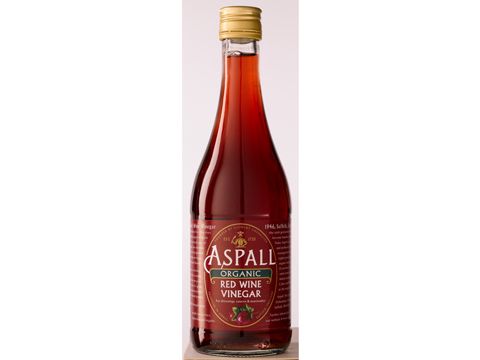 Aspall Organic Red Vinegar (£1.76, 500ml) has a rich, full flavour ideal for marinating meat (as well as enhancing the flavour, it will help tenderise the meat).
Aspall Organic Red Vinegar (£1.76, 500ml) has a rich, full flavour ideal for marinating meat (as well as enhancing the flavour, it will help tenderise the meat).
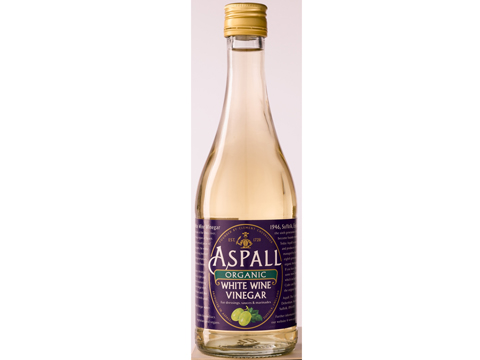
Aspall Organic White Wine Vinegar (£1.76, 500ml) is light and crisp, good for French dressings and sauces (especially Hollandaise), and works well with white fish.
BALSAMIC VINEGAR
This dark, sweet, rich vinegar is made in or around Modena in northern Italy. Authentic traditional artisan balsamic vinegar is made from a reduction of Trebbiano grapes, harvested late (for higher sugar content) and left to mature for 10-30 years. It can cost more than £100 per bottle. Cheaper commercial balsamics produced on an industrial scale are made with wine vinegar; some producers use caramel (E150) to colour and thicken it artificially. Most balsamic is a mixture of the above two methods. Price is usually an indication of quality.
• Mixed with olive oil it makes a good dip for bread, or use it for salad dressing, in marinades, over grilled meat or fish or drizzled over fruit, especially strawberries.
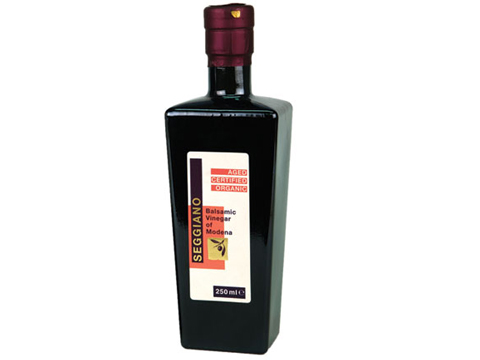 Seggiano Aged Balsamic Vinegar of Modena (£11.99, 250ml) is thick, sweet and aged in wooden barrels for six years. For Seggiano stockists, click here.
Seggiano Aged Balsamic Vinegar of Modena (£11.99, 250ml) is thick, sweet and aged in wooden barrels for six years. For Seggiano stockists, click here.
 Suma Organic Oak Aged Balsamic Vinegar (£5.15, 250ml) from Goodness Direct is a cheaper alternative.
Suma Organic Oak Aged Balsamic Vinegar (£5.15, 250ml) from Goodness Direct is a cheaper alternative.
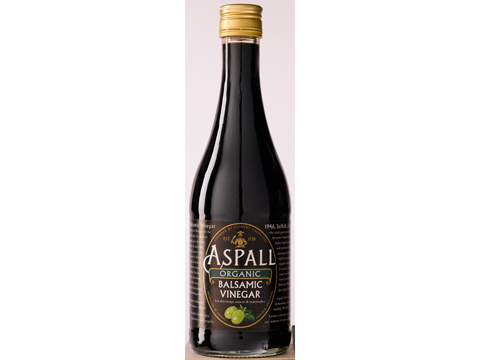 Aspall Apple Balsamic Vinegar (£2.76, 250ml). A twist on traditional balsamic – sweet and appley with a faint toffee taste.
Aspall Apple Balsamic Vinegar (£2.76, 250ml). A twist on traditional balsamic – sweet and appley with a faint toffee taste.
RICE VINEGAR
A staple of Chinese and Japanese cooking, rice vinegar is tangy but mellow. It can be red, white or dark amber in colour. Used in oriental dishes, and especially in dipping sauces and dressings for vegetables and salads.
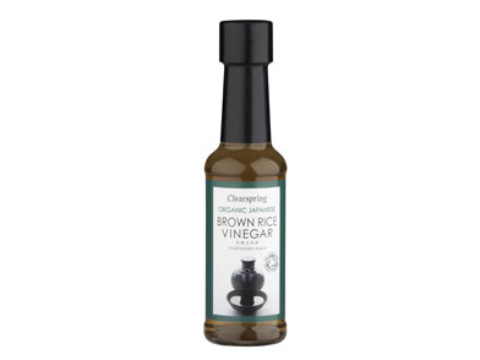 Clearspring Kyushu Organic Brown Rice Vinegar (£2.19, 150ml). Great for giving your cooking an oriental twist. Available from most healthfood and organic stores, supermarkets or from Goodness Direct.
Clearspring Kyushu Organic Brown Rice Vinegar (£2.19, 150ml). Great for giving your cooking an oriental twist. Available from most healthfood and organic stores, supermarkets or from Goodness Direct.
Laura Sevier is a freelance journalist
| READ MORE... | |
 |
GREEN LIVING Scrub for victory Clean the most difficult places in a natural, eco-friendly way. Laura Sevier explains how |
 |
GREEN LIVING Behind the Label: Tomato Ketchup It's the condiment of choice for a million fast-food outlets and a staple sauce in homes around the world, but there's more to tomato ketchup than meets the eye, says Pat Thomas |
 |
GREEN LIVING Aromatherapy in your kitchen: part one - cooking with herbs How to make your food your medicine and medicine your food, starting with six common herbs you can use in your recipes and everyday cooking |
 |
GREEN LIVING New series The Ecologist Top Ten... organic skincreams Beauty advice for the winter season: get enough sleep, eat well and never stray far from a good jar of organic skincream. From Neal's Yard to Weleda, here are the Ecologist's top ten picks... |
 |
GREEN LIVING The Ecologist Top Ten... organic and fair trade teas Our fortnightly new series of Ecologist Top Tens begins with a look at the best organic and fair trade teas your money can buy. Laura Sevier puts the kettle on... |








